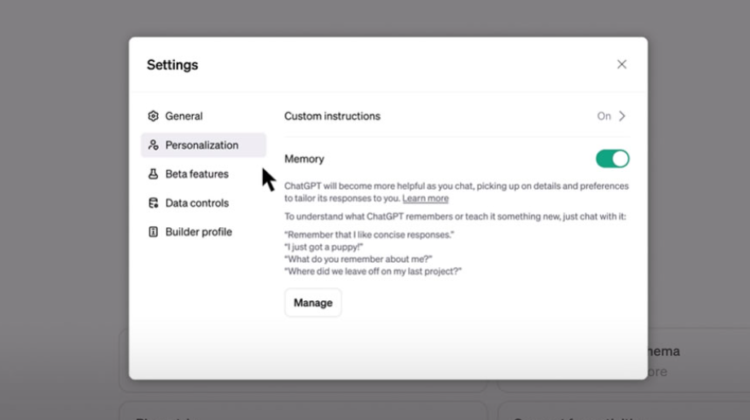Artificial intelligence provider OpenAI endows ChatGPT with “memory,” which enables the chatbot to recall previous conversations and prevent users from repeating themselves.

OpenAI stated in a blog post dated February 13 that the new memory feature would be made available to a “small portion” of ChatGPT premium and free users later this week, adding that details regarding a broader rollout would be forthcoming.
According to OpenAI, as the chatbot engages in more interactions with each user, ChatGPT’s memory feature will gradually improve. With the capacity to retain user preferences and previously exchanged information, the chatbot will be capable of delivering increasingly pertinent and personalized responses over time.
Users can modify the settings for the new memory function to “explicitly tell it to remember something,” inquire about the contents of its memory or instruct it to forget everything.
It is worth noting that the memory feature can be deactivated entirely. Custom instructions explicitly direct ChatGPT to remember specific details and temporary conversations do not consume memory or appear in history.

OpenAI stated that it “may use content” provided to ChatGPT, including memories, for the ongoing training of its large language models; however, the company added that data collection could be disabled.
The company explained that it was evaluating potential biases in the memory feature and that its objective was to prevent it from remembering sensitive data without explicit user instruction.
“We’re taking steps to assess and mitigate biases, and steer ChatGPT away from proactively remembering sensitive information, like your health details – unless you explicitly ask it to.”
Furthermore, OpenAI asserted that the memory function could enhance productivity by acquiring knowledge of its premium users’ work methods, formats, and preferences. The option to “have their own distinct memory” for GPT versions will also be available to developers.
OpenAI launched an application store in January for ChatGPT pro subscribers, enabling them to discover and utilize GPTs, which are tailor-made AI chatbots designed for particular purposes.
Meanwhile, Andrej Karpathy, a founding member of OpenAI and a Microsoft-backed company, recently left the organization.
Kaparthy stated in a post on X dated February 14 that he had departed from the firm the previous day, adding that “nothing had transpired” that would have impacted his decision to resign. He elaborated that he intended to occupy his time with personal endeavors after his departure.
